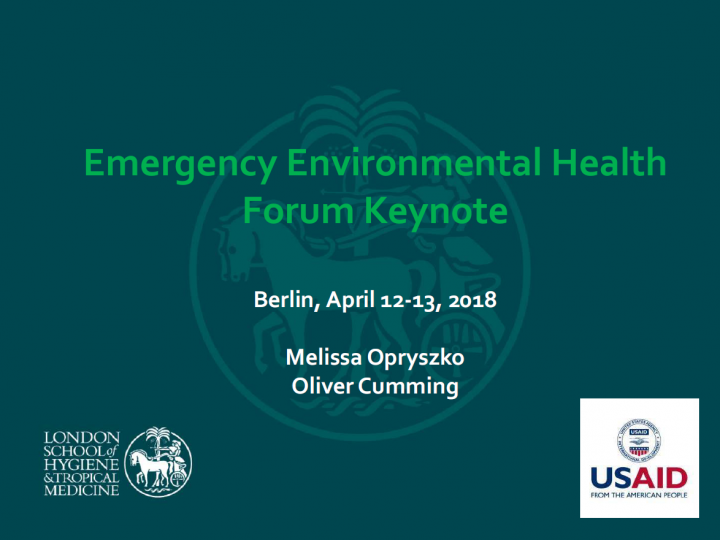8th Emergency Environmental Health Forum in Berlin, Germany - Conference materials
Various Authors (2018)

Published in: 2018
Author:
Various Authors
Uploaded by:
SuSanA Admin
Partner profile:
common upload
5267 Views
273 Downloads
The 8th Emergency Environmental Health Forum (EEHF) event was hosted by the German WASH Network in close collaboration with the Secretariat of the Sustainable Sanitation Alliance (SuSanA) at GIZ. The aim of the 2018 EEHF is:
- To share new research and learning
- To discuss new approaches and innovation in the sector
- To bridge silos between WASH and other humanitarian sectors
- To identify research gaps in the emergency environmental health sector
Content - Summary
Day 1 presentations:
1) EEHF Keynote
2) Evidence Into action: Introducing a cross-sectoral Toolkit for integrating Menstrual Hygiene Management (MHM) into humanitarian response
3) Shining a light on sanitation. Looking at the impact of latrine lighting on sanitation use and gender-based violence in humanitarian contexts
4) Mental health in emergency contexts: Does poor mental health impair WASH-related behaviors in a vulnerable population of rural Malawi?
5) Integrated mobile approach for faecal and septic sludge treatment, reuse and disposal using microwave irradiation
6) Disinfection of human excreta in emergency settings: a comparison of chlorine-based and hydrated lime-based disinfectant solutions.
7) Development of a field lab for monitoring of faecal sludge treatment plants
8) Oxfam’s response to the diphtheria outbreak in the Rohingya refugee crisis, Cox’s Bazar 2017-2018
9) First phase WASH response to plague in madagascar
10) Effectiveness of a Household WASH Package on an Outpatient Program for Severe Acute Malnutrition: A Pragmatic Cluster-Randomized Controlled Trial in Chad
11) UNHCR’s Waste to Value Sanitation Portfolio
12) User-centred sanitation design through rapid community engagement
13) Child Participation in Sanitation Design in Emergencies
--
Day 2 presentations:
1) Management systems for ensuring sustainable WASH facilities in humanitarian contexts
2) Challenges and Constraints of implementing community approaches for total sanitation in conflict area: case study of the implementation of CLTS in Boko Haram conflict area in Cameroon
3) Vector Control in Humanitarian Emergencies
4) A systematic review and meta-analysis of the impact of water, sanitation, and hygiene exposures in case-control studies on cholera transmission
5) Evaluating the effect of an MSF hygiene kit intervention on domestic transmission of cholera among household contacts of cholera-infected patients: a study protocol
6) Motivators and Barriers to Handwashing Behavior during Humanitarian Emergencies
7) Pre-test Findings of a New Interactive Handwashing Promotion Program –Mum’s Magic Hands in Emergencies using Emotional and Health Motivators.
8) Do we need to do hygiene promotion differently in humanitarian emergencies?
9) The need for low cost & sustainable wastewater treatments in protracted emergencies. A case study from Rakhine State, Myanmar
10) Wastewater Strategy for UNICEF-Lebanon
11) Wastewater treatment plant efficiency
Bibliographic information
Various Authors (2018). 8th Emergency Environmental Health Forum in Berlin, Germany - Conference materials.
Filter tags
Camps (emergency or longer term) English Europe & Central Asia Posters, brochures and flyers Presentations














